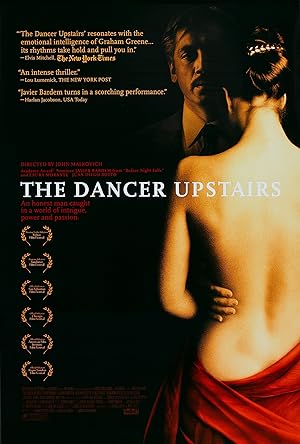I loved loved loved The Dancer Upstairs so much that I almost watched it three times in a row on the same day. If you want to watch The Dancer Upstairs and are looking for company, please let me know. I will happily watch it again. I loved The Dancer Upstairs so much that I want to record commentary on each scene instead of writing an overall review about the entire movie.
The Dancer Upstairs is a sophisticated thriller with no sensational trite moments like car chases or people running from rooftop to rooftop. The Dancer Upstairs is a great story that is rooted in a real life story of the Shining Path, a Maoist terrorist group in Peru. John Malkovich is a great debut director, and each scene reveals more than you may realize at first glance. If you combine the subtle yet retrospectively revealing shots and mise en scene, the sophisticated dialogue that is not just an information dump in exposition and the incredibly nuanced acting of the entire including the eternally magnificent Javier Bardem, The Dancer Upstairs is a perfect movie. A friend called it slow. I call The Dancer Upstairs deliberate, mature and a masterpiece. The Dancer Upstairs is definitely vying for the spot of one of my favorite movies. Did I mention that I love it?
The Dancer Upstairs mainly focuses on Bardem’s character, Agustin Rejas, a former lawyer turned detective. Since childhood, he is disillusioned about his government over the loss of his father’s farm and again as a lawyer when he loses a case due to government corruption. He is the foil of the largely unseen terrorist leader, President Ezequiel, who actively seeks to destroy the government. Rejas is framed as the only one who can stop him if government corruption and brutality in various forms and his dissatisfaction with his personal life do not stand in his way. Rejas is incorruptible based on his past and because of his ethnic and cultural identity. He can slip between worlds as a bourgeoisie city sophisticate or a Native American who can travel in the back of flat bed trucks. His experience with prejudice is an asset. His past haunts him during the investigation of the terrorist group. Pivotal figures from his past reappear: enemies are now supervisors and childhood friends harbor terrorists and torture beloved figures from his childhood. He is invested in protecting the ideal of how government should serve and protect his people, and indeed he and his coworkers may be the only thing protecting the people from the brutal and abusive government that they serve and critique.
On a basic, personal level, it is about how hard it is to do a job when the people who are in charge don’t care, don’t know how to really serve and only care about power or theories instead of how to apply theory. On a state level, The Dancer Upstairs is a slowly escalating movie about how terrorism is inflicted by terrorists and the government that seeks to stop the terrorists. The danger starts small then exponentially increases as the movie unfolds until everyone is consumed with dread, but the rhythm of the escalation is consistent and steady until it culminates with Bardem meeting his daughter’s dance teacher intercut with the scenes of a major government official being assassinated during a dance theatrical performance.
The Dancer Upstairs assumes that the audience knows more about the characters than the characters do so while the detective and teacher are attracted to each other, they do not realize how wrong their first impressions are of each other. Bardem keeps his job a secret, but his social climbing wife is not what he wants his daughter to be whereas this thoughtful, serious and psychologically wounded dancer teaches his daughter how to be proud of who she is. The tragedy of The Dancer Upstairs is how all these people, terrorists and government officials, are simultaneously, metaphorically and literally closer to each other than they realize, but are so psychologically estranged that they are worlds away. President Ezequiel, the cause of so much bloodshed, is like the Wizard of Oz: terrifying and disappointing, but no less culpable than the corrupt government that spawned him.
The Dancer Upstairs is one of the most beautiful films that I’ve ever seen and seems to suggest that there is some seed of hope buried in the daughter as a combination of the best characteristics of her establishment father and her terrorist teacher. If you enjoyed The Dancer Upstairs or are interested in learning about Peru and terrorism, then watch The Fall of Fujimori.
Stay In The Know
Join my mailing list to get updates about recent reviews, upcoming speaking engagements, and film news.




